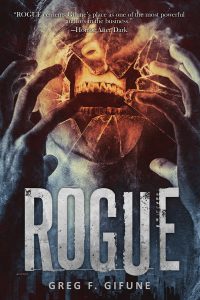
Greg F. Gifune
JournalStone Publishing (September 14, 2018)
Reviewed by Andrew Byers
The veneer of the American Dream—loving spouse, solid job, nice house, comfortable life—fractures catastrophically in Greg F. Gifune’s Rogue, revealing a narrative that intricately weaves psychological unraveling with supernatural horror. Gifune takes readers on a harrowing journey through the life of Cameron Horne, a man whose seemingly idyllic existence spirals into a nightmarish descent. This tightly-woven and unsettling exploration delves into the complexities of identity and the inexorable pull of the unknown.
Cameron Horne starts with what we might assume to be the quintessential American life but the fabric of his reality begins to unravel almost as soon as the novel begins. Gifune crafts a compelling premise here, introducing readers to a protagonist whose descent into darkness becomes an irresistible vortex of mystery and terror. Cameron is a civil servant who monitors registered sex offenders, which brings him into daily contact with some of humanity’s worst on a daily basis. As the narrative progresses, he is beset by increasing bouts of confusion, missing time, and sudden fits of violence. He eventually comes to experience even more disturbing things that deeply upset the fabric of his daily life and cause him to begin to question everything about himself.
As Cameron grapples with bizarre episodes of lost time, horrifying nightmares, and a haunting figure that seems to possess knowledge of the future, the narrative takes on an otherworldly hue. Gifune masterfully blends psychological horror with the supernatural, creating an atmosphere that is both disquieting and captivating. The question of whether Cameron is losing his mind or being stalked by an evil force becomes a central enigma, propelling the plot forward with relentless suspense.
The characterization in Rogue is a testament to Gifune’s narrative prowess. Cameron Horne is more than a mere vessel for the story; he is a complex, multifaceted character whose internal struggles mirror the external horrors he faces. Gifune delves into Cameron’s psyche with nuance, portraying the internal conflict between his mild-mannered facade and the awakening of something primal and malevolent within. Because he experiences missing time, confusion, and uncertainty about what is happening to him—is everything he seems to experience real?—we, like Cameron himself, take a journey to discover the mystery at the heart of Cameron’s increasingly troubling experiences and crumbling persona.
The atmospheric elements of the novel contribute significantly to its impact. Gifune’s ability to evoke a sense of dread is palpable, as shadowy figures, mysterious voices, and haunting visions encroach upon Cameron’s reality. The pacing of Rogue is a finely tuned symphony of tension and revelation. Gifune skillfully tightens the narrative screws, allowing suspense to mount steadily as the protagonist’s descent accelerates. The oscillation between moments of eerie calm and explosive violence adds a dynamic layer to the storytelling, keeping readers on the edge of their seats.
In Rogue, Gifune blends elements of horror, psychological thrillers, and supernatural mystery seamlessly. The novel stands as a testament to his ability to craft narratives that transcend genre boundaries, offering readers a nuanced and chilling exploration of the human psyche under the weight of malevolence. As the layers of Cameron Horne’s unraveling are peeled back, Rogue becomes a haunting odyssey that lingers in the mind, inviting contemplation of the boundaries between sanity and the unknown.
- Book Review: EXTINCTION DREAM - August 18, 2025
- Book Review: THE SOLSTICE - August 12, 2025
- Book Review: THE SECRET HOUSE - August 8, 2025
- Book Review: RABBIT FACE AND FURTHER AWFUL ENCOUNTERS - August 4, 2025
- Book Review: BOGGANMOR - January 30, 2025
- Advance Review: AT DARK, I BECOME LOATHSOME - October 11, 2024
- Advance Review: A DISTANT SILVER MELODY - October 1, 2024
- Advance Review: ISLAND OF THE DEAD - August 25, 2024
- Book Review: THE ABYSSAL PLAIN - August 23, 2024
- Book Review: BLACK SEAS OF INFINITY - July 24, 2024


